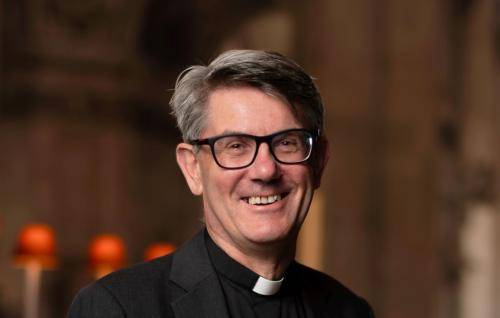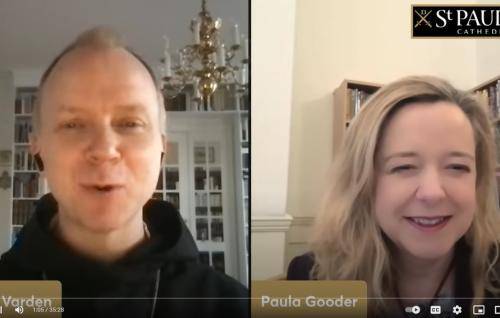A Commoner's Messiah
A Commoner's Messiah
David Benjamin Blower reflects on the Messiah as we move through Holy Week into Easter.
1. Who do we follow?
I grew up hearing about a character called Christ. Christ was the subject of wonderful tales. Christ was a law of the universe woven into theological formulas and turns of phrase. I didn't always know what people meant when they said things about Christ, but I knew that it was important to look like I knew.
I was an odd child in that I read the Bible for pleasure. I couldn't help noticing a difference between the Christ I often heard about and the Messiah character I read about. Messiahs are rather earthy folks, often associated with messy political events.
You may be wondering why I’m making such a thing about the two words – after all Christ is the Greek translation of the Hebrew word Messiah. For me, though, the point is that they convey something strikingly different. While Christ was otherworldly and serene, the Messiah in my Bible was homeless, Jewish, argumentative, merry, colonised and criminalised. While Christ was the singular figurehead of the Christian religion, Messiahs are always coming and going: this particular one would not have known what a Christian was. While Christ assured me of peace after death, the Messiah was rashly involved in the world of the living, with talk of casting down rulers, ending war and law, subverting money, and making the world a joyous and peaceful place.
We are close to the Easter story of crucifixion and resurrection: a tale of supernatural things. Things beyond my experience. As some tell it, the death of Christ was a sort of regrettable tragedy, mysteriously orchestrated by God to save individual souls. But there’s nothing mysterious about Messiahs facing execution. Messiahs were usually outlaw figures on a knife edge, confronting violent political powers. The Romans had killed plenty of them.
A serene and distant Christ calls people to follow him into some inward space of serenity. I try to go there every day. But when the Commoner’s Messiah calls me to follow him, to what am I called? To homelessness and poverty and marginal life? To drinking and feasting and partying? To giving time and attention to people who are commonly ignored? To welcoming the enemy? To the social position of slavery? To taking sides and speaking truth to power?
The Commoner’s Messiah is not quite like that distant serene figure. He is dangerously present. No one who lives out the world as it could be, ever comes out unscathed. I am curious about this business. I want to spend Easter with this Messiah, and to allow his rather earthly practices to shine a light on my own place in this world, stretched as it is between the powerful and the powerless.
2. On confrontation
I grew up in the South, so I'm not trying to score cheap points when I say that Jesus was a Northerner. Most of the doings we read about in Matthew, Mark and Luke happen in the North, in the small towns and rural areas. These stories of healings and feasts and inspired discourses happen in the politically marginal places, mostly among marginal people. But as the story develops the Commoner’s Messiah keeps giving hints that at some point they will be going South. Everybody knows there is another kind of energy down South; down in the Capitol where the power lies. At one point Thomas speaks aside to the worried followers, “let us go with him to Jerusalem to die with him.” It sounds like the stuff of doomed political revolutions.
It has always been popular to say that Jesus was not political. By saying this wildly untruthful thing we have always been able to solve two problems. The first problem is that, if he was political, most would say he was unsuccessful. The world carried on, same as ever. The second problem is that, while his followers were awaiting an immediate return to settle the score, the return has been a long time coming. It became popular to talk as though this Messiah had no interest in confronting the world or changing it. The political Messiah became the serene and distant Christ.
Let’s tarry a while though, with this Commoner’s Messiah figure. Let’s stay with the trouble and allow the story to remain open and incomplete.
When the Messiah finally arrives in Jerusalem it's quite a scene. It had been a long time coming. He famously rides in on a donkey with a singing crowd as though they were welcoming some new pauper king. The Jerusalem elites are quite rightly on edge. They’re trying to keep the Romans sweet, and nothing sets the colonisers off like the sound of indigenous self-determination. The indigenous american ghost-dance was declared illegal by European colonisers for exactly the same reason. “Tell your followers to be quiet!” they say to the Commoner’s Messiah.
When the procession comes to a stop, Jesus gets off his donkey and wanders around the temple. He looks around at everything and says… precisely nothing. The story is on a knife edge. You can hear the crowd breathe. The time has come for a confrontation. There will be a week of turning over tables and public challenges to the powers that be.
There is a time for everything. It’s not always the time to confront the powers. But if, for me, the time to confront them never arrives, it is quite likely that I am unknowingly among those who need confronting.
3. The Inevitable
There is a beautiful scene at the end of Luke's gospel. Two disillusioned disciples wander down the road away from the scene of execution. The risen Messiah quietly joins them, shrouded in some disguise. They're talking about “Good” Friday's horrible events, and the collapse of their movement, and about rumours of a missing body. Jesus interjects: “of course, it was necessary that the Messiah should suffer…”
“Necessary” is the common translation. The Greek word is edei and might be better translated “inevitable” or “bound to be…”. It was inevitable that the Messiah should suffer.
The difference between the necessary and the inevitable is subtle but real. Necessary puts us in the realms of that Christian theology, where some cosmic exchange is achieved by the death of Christ; as was necessary to bring salvation to the converted individual. Inevitability takes us back to the realm of messianic figures and political liberators, who are bound to run into trouble. How many historical figures can you think of, who were somehow got rid of because they campaigned for liberating change? Those who refuse the rulebook of an unjust world inevitably face its “justice”. The execution of the Commoner’s Messiah was not a freak error in the Roman justice system. This was exactly what Roman justice was designed to do: to crush every threat to its rule and dominion.
I find it rather hard to imagine a world without rule and law. We have laws to keep us safe in a world where bad things happen. It is of course also inevitable that the makers and keepers of the law are not perfect. And we know that, at certain times and places, they have not even been good. Law itself easily becomes an expression of the violence it seeks to keep at bay.
In Judaism, it has sometimes been suggested that there will be no law in the messianic age, because the world will be healed. All will live in goodfaith and law will be meaningless. This is what Paul had in mind when he rather rashly announced that “the Messiah has abolished the law!” and that “the rulers of this age are coming to nothing!”
In the meantime, the world limps on still under law and rule. Rulers of good intent and rulers of ill-will both keep the world in their check. Those who live beneath that sort of power must find their own way of living in goodfaith, and there may come times when living in goodfaith will put a person at odds with the powers that be.
There’s a quiet promise in this story. The disillusioned disciples wander away from the scene of defeat, without realising their messiah figure is walking along with them. It’s worth it. Even if you lose, you still win. You didn’t give in to the world as it is. You stayed true to the world as it will be. The first world will pass; the latter will last forever. It’s already here, though we rarely notice it.
4. Breakfast with Friends
I once heard someone say that, across many cultures, eating together is commonly a marker of kinship. It's a way of saying we’re friends, or even family, and we have each other’s backs. I can recall many joyous dinner parties as well as some awkward ones. But there’s something a little different about eating breakfast with friends. Breakfast is rarely a well orchestrated social performance, as dinner so often is. When I find myself eating breakfast with a friend, it's usually not the main event but the morning after. The scenario is unmanaged and relaxed. My hair is a mess. We are seeing one another in the unforgiving light of the morning, even before coffee.
In the gospel stories there is a strange and enigmatic window of time between the resurrection of the Commoner’s Messiah, and his disappearance into the heavenly realms. It is said to be a period of around 40 days, when a man who was executed by the Romans walks freely about the world, talking to his friends. Very little is said about this time, and I find myself filling the silence with my curious imaginings. What did they talk about? What is it like spending time with a resurrected person? What did they think would happen next? Naturally I have a Spring-adjacent feeling about it: a brief time when heavenly peace seems to interrupt the grind of history with joyous, careless, irrepressible life.
One beautiful glimpse into this period tells that Jesus had taken himself to the banks of lake Galilee, where he knew his friends would be fishing from dawn. While they worked unawares, he busied himself. He started a fire on the shore, and set about cooking some fish for breakfast. Where did he get them? Did he have to gut them? Was he a good cook? Did he have some herbs up his sleeve? Did he hum while he went about the task?
And then famously he calls to his friends in their boat, and they recognise him and join him for breakfast. There they have conversations that preachers and theologians have talked about ever since, but I am mostly taken by the fact that he made them breakfast. Hot food. Woodsmoke in your hair. Lapping waves. Hugs and kisses, or handshakes and pats on the back, I don’t know. But this is an image of the Messiah that I love. I have done this for others and others have done it for me. It is so ordinary and yet it means so much. The times are hard, and the path often hurts. Friendship is a messianic task. Make breakfast for someone.








